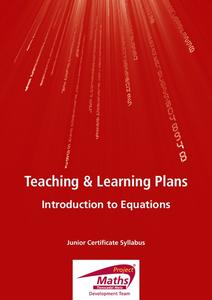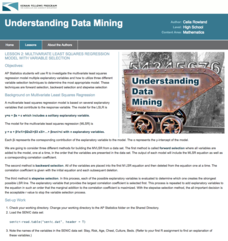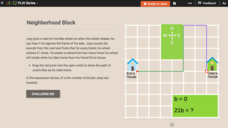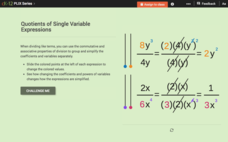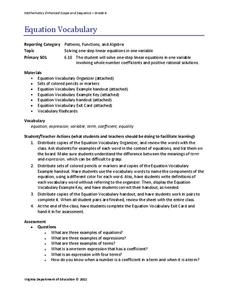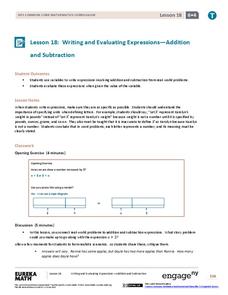College Board
Random Variables vs. Algebraic Variables
Variables can vary in meaning. A reference material for AP® Statistics explains the difference between random and algebraic variables. It provides a hypothetical situation involving dice—great for use in a classroom situation.
College Board
2016 AP® Statistics Free-Response Questions
Test your classes on their knowledge of advanced statistic concepts. Young math scholars get a sneak peek at the end of course AP® statistics exam with the released items from the 2016 test. The six-question free response exam addresses...
Google
Code for Equality
It's my belief that all learners should have equal access to computer science projects! Young computer scientists learn about variables, encapsulation, sequences, and objects in block-based coding. They create a collage by first...
Google
Snapchat Geofilter
Sometimes pictures could use a little help. Scholars add filters, frames, stamps, and text to a background photograph. They learn to use variables, encapsulation, sequences, and objects as they use the Blockly programming language.
Google
Design Your Own Emoji Holiday
You'll want to rank the project with a smiley face. Future computer scientists complete a fun activity where they design a holiday-themed emoji. They use block-based coding and learn about the concepts of variables, encapsulation,...
PBS
Scale City — Inverse Proportions and Shadows in the Real World
Bring the resource out from the shadows. Viewers of a short video learn about drive-in theaters and how operators project images onto a large screen. They then perform an experiment to determine the relationship between the distance of...
Microsoft
Variables
You won't want to replace the resource with anything else. Future computer scientists use Minecraft to learn about variables in computer coding. They engage in several activities to master the variable code block, then apply it in an...
Concord Consortium
Graphing Elements
How do you graph a sentence? Scholars do just that as they represent relationships between independent and dependent variables with a graphical representation. Given a sentence, they determine the pertinent relationship and create a...
Project Maths
Introduction to Equations
Do your pupils truly understand inverse operations, or is their understanding a little backward? Scholars learn the meaning of an equation in the second lesson of a four-part Algebra series. A series of activities begins with an...
Kenan Fellows
Multivariate Least Squares Regression Model with Variable Selection
The risk of contracting an infection in the hospital is low, but it does happen. Learn what risk factors have the highest correlation with hospital-acquired infections in the final lesson of a three-part series. Using the open source R...
101 Questions
Coke Jacuzzi System of 3
Can you determine the exact volume of a bottle based on the relative volume of other bottles? A series of four videos shows someone pouring fluid into bottles. Scholars must set up a system of equations to determine how much each bottle...
Teach Engineering
Better By Design
Which modification is the best? Using the scientific method, pairs determine the effects of each control surface on the distance of a glider's flight. The activity, section 16 in a 22-part unit on aviation, allows pupils to gain a better...
Teach Engineering
Airplane Tails and Wings: Are You in Control?
Keep everything under control. The instructional activity, the 16th segment in a 22-part unit, provides a more detailed look at the parts of a plane, specifically the control surfaces. Pupils learn about the construction of the wings and...
Alabama Learning Exchange
Solving Formulas for the Given Variable
Recycle, reuse, and rearrange! Young scholars learn to rearrange formulas to highlight a variable of interest. They then use their new formulas to make calculations.
CK-12 Foundation
Single Variable Expressions: Neighborhood Block
The number of bicycle wheel turns is as good as any way to describe the distance from school to home. An interactive lets young mathematicians determine the number of city blocks a person bicycles. They use this information along with an...
CK-12 Foundation
Simplify Products or Quotients of Single Variable Expressions: Quotients of Single Variable Expressions
Investigate division within an algebraic term using an inquiry-based lesson. Individuals adjust sliders and watch as the simplification of the term changes. Questions help guide them to important conclusions.
CK-12 Foundation
Sums and Differences of Independent Random Variables: Traveling Seasickness
Use a Punnett square to calculate probabilities. The resource presents a situation in which two patients are randomly selected from a group of patients with a particular illness. Pupils use the interactive to determine the likelihood...
CK-12 Foundation
Linear Systems with Addition and Subtraction: Fill in the Boxes 2
Systematically combine shapes to arrive at one solution. The resource models a system of linear equations using colored shapes. Pupils follow rules to combine circles and squares to add the two equations together, resulting in one...
CK-12 Foundation
Linear Systems with Addition and Subtraction: XYZ Tiles
Cover it up to reveal the values of variables. Using arrangements of colored tiles representing algebraic expressions, pupils layer them over each other to determine the values of variables. The procedure models the elimination method in...
CK-12 Foundation
Systems of Linear Equations in Three Variables: Intersecting Planes - No Solution
How many different ways can three planes intersect? The interactive provides three movable planes. Pupils manipulate the planes to determine the number of solutions possible based upon their intersections.
CK-12 Foundation
Joint and Combined Variation: Variable Sliders
Learners use a pair of sliders to investigate how changes in a variable affects other variables in joint variation. A set of five challenge questions tests understanding.
Virginia Department of Education
Equation Vocabulary
You'd feel bad if someone called you by the wrong name — and equations are no different. Young mathematicians learn the vocabulary associated with equations and expressions identifying these components in sample equations.
EngageNY
Writing and Evaluating Expressions—Addition and Subtraction
Let Y represent Yes to using an excellent resource. Pupils first learn to define variables using a complete description in the 19th part in a series of 36. They write expressions involving addition and subtraction in real-world...
EngageNY
Read Expressions in Which Letters Stand for Numbers III
Those key operation words sure come in handy. Groups continue their work with converting between different notations for algebraic expressions. They work in stations to write the symbolic form for given verbal phrases. This is the 17th...










